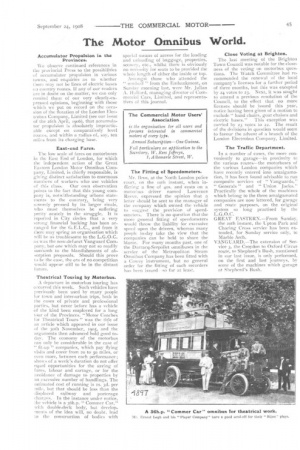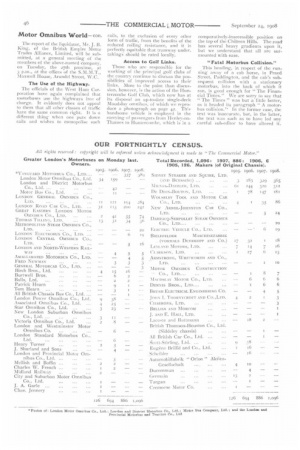The Motor Omnibus World.
Page 5

Page 6

If you've noticed an error in this article please click here to report it so we can fix it.
Accumulator Propulsion in the Provinces.
We observe continued references in the provincial Press to the possibilities of accumulator propulsion in various towns, and enquiries as to whether there may not be lines of electric buses oil country routes. If any of our readers are in doubt on the matter, we can only remind them of our very clearly-ca.pressed opinions, beginning with those which we put on record on the occasion of the flotation of the London Elec.trobus Company, Limited (see our issue of the 26th April, i906), that accumulator propulsion is absolutely impracticable except on comparatively level routes, and within a radius of, Sa y, ten miles from its charging base.
East-end Fares.
The low scale of fares on motorbuses in the East End of London, for which the independent action of the Great Eastern London Motor Omnibus Company, Limited, is chiefly responsible, is giving distinct satisfaction to enormous numbers of workers who use vehicles
of this class. Our own observation points to the fact that this young company is, notwithstanding urbane statements to the contrary) being very save rely pressed by its larger rivals, who must themselves be suffering pretty acutely in the struggle. It is reported in City circles that a very strong financial backing has been arranged for the G.E.L.C., and from it there 'nay spring an organisation which will be as troublesome to the L.G.O.C. as was the now-defunct Vanguard Company, but one which may not so readily succumb to the blandishments of absorption proposals. Should this prove to he the case, the era of no competition would appear still to be in the distant future.
Theatrical Touting by Motorbus.
A departure in motorbus touring has cwcurred this week. Such vehicles have previously been used by many people for town and inter-urban trips, both in the eases of private and professional parties, but never before has a vehicle of the kind been employed for a long tour of the Provinces. "Motor Coaches for Theatrical Tours " was the title of an article which appeared in our issue of the 3oth November, 1905, and the arguments then advanced hold good today. The economy of the motorbus can only be considerable in the case of " lit-up " companies, which pay flying visits and cover from 20 to so miles, or even more, between each performance; shows of a week's duration do not offer equal opportunities for the saving of fares, labour and cartage, or for the avoidance of damage to properties by an excessive number of handlings. The estimated cost of running is Is. 3d. per mile, but that should be less than the displaced railway and porterage ehar;4-es. In the instance under notice, the vehicle is a 36h.p. " Commer Car," with double-deck body, but develop-nenis of the idea will, no doubt, lead lo the construction of bodies with
special means of access for the loading and unloading of baggage, properties, scenery, etc., whilst there is obviously no necessity for seats to be provided the whole length of either the inside or top. Am(mgst those who attended the
" " from the Embankment, on Sundae morning last, were Mr. Julian A. lialford, managing director of Commercial Cars, Limited, and representatives of this journal.
The Fitting of Speedometers.
Mr. Bros, at the North London police court, on the loth instant, when inflicting a fine of 405. and costs on a motorlms driver named Lawrence Reeve, expressed the opinion that a letter should be sent to the manager of the company which owned the vehicle to suggest the provision of speedometers. There is no question that the more general fitting of speedometers would throw the liability for excessive spmd uixm the drivers, whereas many people to-day take the view that the companies can be. held to share the blame. For many months past, one of the Darracq-Serpollet unmibuses in the service of the Metropolitan Steam Omnibus Company has been fitted with a Cowev instrument, but no general order for the fitting of such recorders has been issued so far at least.
Close Voting at Brighton,
The last meeting of the Brighton Town Council was notable for the closeness of the voting on motorbus questions. The Watch Committee had recommended the renewal of the local company's licenses for a further period of three months, but this was excepted by 24 votes to 23. Net it was sought to amend a previous resolution of the Council, to the effect that no more licenses should be issued this year, notice having been given of a motion to exclude " hand chairs, goat chaises and
electric buses." This exception was carried by 23 votes to 22. The result of the decisions in question would seem to favour the advent of a branch of the London Electrobus Company., Limited.
The Traffic Department.
In a number of cases, the more conveniently to garage—in proximity 10 the various routes—the motorbuses of the various London companies which have recently entered into amalgamation, it has been found advisable to run composite services of " Vanguards,' " Generals " and " Union Jacks." Practically the whole of the machines which belong to the three amalgamated companies are now lettered, for garage and route purposes, on the original system so long practised by aft GREAT EASTERN.—From Sunday, the 20th instant, the Upton Park and Charing Cross service has been extended, for Sunday service only, to Marble Arch.
VANGUARD.—The extension of Service 3, the Croydon to Oxford Circus route, to Shepherd's Bush, mentioned in our last issue, is only performed, on the first and last journeys, by some of the machines which garage at Shepherd's Bush.
The report of the liquidator, Mr. J. B. King, of the British Empire Motor Trades Alliance, Limited, will be submitted, at a general meeting of the members of the above-named company, on Tuesday, the 27th proximo, at 3 p.m., at the offices of the S.:MALT., Maxwell House, Arundel Street, W.C.
The Use of the Highway.
The officials of the West Ham Corporation have again complained that motorbuses use the highways free of charge. It evidently does not appeal to them that all other classes of traffic have the same common right. It is a different thing when one puts down rails and wishes to monopolise such rails, to the exclusion of every other form of traffic, from the benefits of the reduced rolling resistance, and it is perfectly equitable that tramway under. takings should be rated locally.
Access to Golf Links.
Those who are responsible for the working of the principal golf clubs of the cOnGtry continue to discuss the possibilities of improved access to their links. More to the point than discussion, however, is the action of the Huntercombe Golf Club, which now has at its disposal an up-to-date single-deck Maudslay omnibus, of which we reproduce a photograph on page 42. This handsome vehicle is employed in the carrying of passengers from Henley-onThames to Huntercomhe, which is in a
comparatively-inaccessible position on the top of the Chiltern Hills. The road has several heavy gradients upon it, but we understand that all are surmounted with ease.
"Fatal Motorbus Collision."
This heading, in respect of the running away of a cab horse, in Praed Street, Paddington, and the cab's subsequent collision with a stationary motorbus, into the back of which it ran, is gcxxl enough for "The Financial Times." We are sorry to say that " The Times " was but a little better, as it headed its paragraph " A motorbus collision." In the former case, the text was inaccurate, but, in the latter, the text was such as to have led any careful sub-editor to have altered it.




















